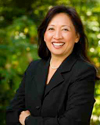Meet the New Dean of Students
Open gallery

Anna Gonzalez, former associate vice chancellor for student affairs at the University of Illinois, joined the Lewis & Clark community last summer as the new dean of students. Gonzalez is a liberal arts graduate of Loyola Marymount University and has been in the student affairs field for 20 years.
When you first arrived at Lewis & Clark, you lived in one of the student apartments on campus. What was that like?
I loved living in a residence hall! I got to see the things that work—everything students appreciate that make them feel safe and protected so they can study and grow. But I also saw the things that didn’t work—mostly operational things, like the laundry system. (By the way, next year we’re going to have free washers and dryers for all students who live on campus.) The experience helped me become a better advocate for our students.
What’s been on your radar this first year?
When I first got here, I asked students, “If you were dean of students, what would you fix first?” Everyone said food! The way many colleges set up eating is outdated—it encourages binge eating because students load up knowing they can go through the line only once. It’s not healthy.
Next fall, we’re going to offer students the option of eating anytime during a meal period and as many times as they want. It will be more like home. We’re also letting students bring in their own mugs for coffee, water, or soda. And then they can help themselves to a cookie or an apple on the way out. We’re also going to provide educational programs about healthy eating. Basic stuff.
You’re committed to diversity. What does that word mean? How do you plan to cultivate diversity at Lewis & Clark?
At a very basic level, diversity is difference, but I don’t use that definition. For me diversity is about issues of power and privilege. So we’re talking about power and gender, race and ethnicity, income and class, and so on. We’re grappling with these issues, knowing that it’s not going to be a pretty conversation, but we’re going to invest in that conversation. I love doing that. What I’m trying to do is look at how we create cultural competency among our students. It should start at orientation and continue throughout their time here. I don’t want our students to be spectators—I want them to be engaged.
How do you view the partnership between student life and academics?
The connection between student life and academics is vitally important. I always tell people that students spend an average of 154 hours each week outside the classroom. The places where they eat, the way their residence halls are built and look, the counseling and wellness services we offer—all of these things can enhance success in the classroom.
As an example, we’re in the process of creating living-learning communities. In five years, 30 percent of those living on campus will be part of these environments. Students in these communities will be grouped according to their interests (like we do now), but we’ll also have faculty advisors who will enhance the overall experience.
As dean of students, I am spreading the message that learning happens in student lives beyond the walls of the classroom. Our students’ classroom is all over campus and outside of it. They are constantly questioning and learning. We need to figure out how faculty and staff can work together to support them.
What do you want students to take away from their campus experience?
I’d like them to have the capacity to understand complexity in the world and to handle that. Because the world is complex! I also want our students to figure out how they can contribute to society, how they want to live in the world, and where they can contribute their unique gifts. I don’t want to define those things for them. I want them to be accountable to themselves, to their gifts, and to others.
What do you like about Portland?
I’m a foodie, and Portland is the best if you like to eat. I’m also loving nature, even though I don’t tend to think of myself as a nature person. I go to Tryon Creek State Park, rain or shine, every weekend. It’s been really cool. You get a sense of yourself.
—Compiled by Megan Morin CAS ’13
More L&C Magazine Stories
Lewis & Clark Magazine is located in McAfee on the Undergraduate Campus.
MSC: 19
email magazine@lclark.edu
voice 503-768-7970
fax 503-768-7969
The L&C Magazine staff welcomes letters and emails from readers about topics covered in the magazine. Correspondence must include your name and location and may be edited.
Lewis & Clark Magazine
Lewis & Clark
615 S. Palatine Hill Road MSC 19
Portland OR 97219

